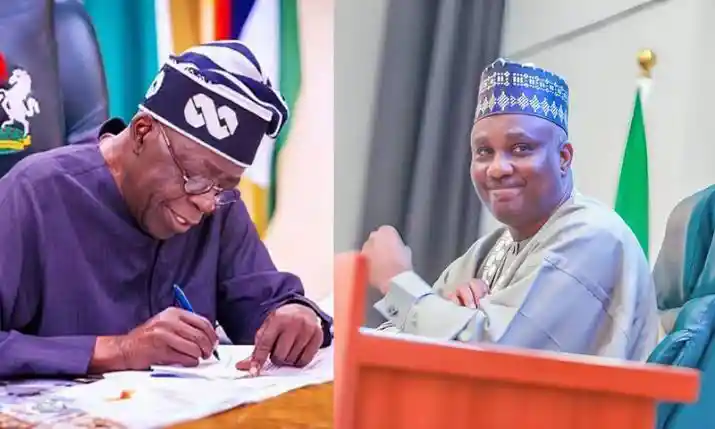The Speaker of Nigeria’s House of Representatives, Rt. Hon. Abbas Tajudeen, has issued a stern warning over the country’s worsening debt crisis, describing the pace of borrowing as “alarming” and unsustainable. He urged the Federal Government to immediately review its borrowing strategy and prioritize fiscal discipline to safeguard the nation’s economic future.
Speaking at a two-day National Conference on Debt and Development organized by the African Network for Environment and Economic Justice (ANEEJ) in Abuja, Tajudeen warned that the country’s debt burden had crossed statutory thresholds and was now a major threat to economic stability.
Pay Attention To: Eight NSCDC Officials Killed, Chinese Expatriate Abducted in Okpella
TJ News Nigeria reports that the Speaker expressed concern about Nigeria’s growing reliance on loans, particularly external borrowing, stating that the pattern could mortgage the future of generations yet unborn.
Nigeria’s Debt Profile Hits N149.39 Trillion
According to the Debt Management Office (DMO), Nigeria’s total public debt stood at ₦149.39 trillion as of Q1 2025, a sharp increase from the previous year. Projections indicate that the figure could exceed ₦183 trillion if the Federal Government’s latest borrowing proposals are approved.
“Our debt profile has crossed the line of sustainability. We cannot continue this reckless borrowing spree that mortgages the future of our children,” Tajudeen stated at the event.
The Speaker’s remarks come amid heightened scrutiny of President Bola Ahmed Tinubu’s borrowing plans, including a controversial proposal to secure $24 billion in external loans for the 2025–2026 fiscal cycle.
Calls for Stronger Legislative Oversight
Tajudeen emphasized the National Assembly’s responsibility in ensuring fiscal discipline, amid criticism that both the House of Representatives and Senate have been too quick to approve loan requests from the executive arm of government.
“We must balance the need for development with fiscal discipline. Borrowing must be tied to tangible projects, not recurrent expenses,” he said, adding that his leadership, alongside Senate President Godswill Akpabio, would strengthen oversight of debt approval processes.
Opposition leaders, including Atiku Abubakar and Peter Obi, have also publicly criticized the Tinubu administration’s debt policies, warning that continued borrowing could further weaken Nigeria’s currency, increase inflation, and erode investor confidence.
ANEEJ Demands Debt Cancellation
The conference also featured a strong advocacy push for international debt forgiveness. Rev. David Ugolor, Executive Director of ANEEJ, called on creditors like the World Bank, International Monetary Fund (IMF), and other multilateral lenders to grant Nigeria debt relief to ease its economic challenges.
“Debt cancellation is not just a necessity; it is a moral imperative. Nigeria needs breathing space to invest in development rather than servicing debts,” Ugolor stated.
Nigeria’s Fiscal Challenges
Experts at the conference highlighted multiple structural problems that contribute to Nigeria’s rising debt, including:
- Overdependence on oil revenues – Nigeria remains vulnerable to fluctuations in global oil prices, which affects revenue projections and borrowing needs.
- Low tax revenue – Tax-to-GDP ratios remain among the lowest in Africa, limiting government capacity to fund infrastructure and social services without loans.
- Weak debt servicing capacity – A large portion of Nigeria’s budget is allocated to servicing debts, reducing funds available for development.
- Exchange rate instability – Currency depreciation has made external debt servicing more expensive, compounding the fiscal burden.
Analysts also warned that Nigeria’s debt-to-GDP ratio, although within regional averages, fails to reflect the country’s low revenue generation capacity, making the debt load riskier than official numbers suggest.
Economic Diversification as a Solution
Tajudeen stressed the importance of reducing Nigeria’s dependency on borrowing through strategic investments in agriculture, technology, manufacturing, and the blue economy.
“We must look beyond oil and invest in sectors that can create jobs, grow exports, and increase revenue. Borrowing should not be a default strategy for governance,” he said.
Economists have echoed this sentiment, arguing that Nigeria must expand its revenue base, block leakages, and promote private-sector-driven growth to reduce reliance on loans.
Public Concerns Over Rising Debt
The debate over Nigeria’s debt has become a major topic of public discourse, with civil society organizations, economists, and political figures urging caution.
Many Nigerians are concerned that continued borrowing without corresponding development outcomes could deepen poverty, worsen unemployment, and trigger long-term economic instability.
Some analysts have called for a comprehensive Debt Sustainability Analysis (DSA) and a cap on government borrowing to prevent fiscal collapse.
Key Takeaway
Nigeria’s escalating debt crisis has sparked national debate, with Speaker Abbas Tajudeen warning that unchecked borrowing could mortgage the country’s future. Calls for stronger legislative oversight, international debt forgiveness, and economic diversification dominated the discussions at the ANEEJ Debt and Development Conference.
As the Tinubu administration pushes for new loans to fund infrastructure and development projects, pressure is mounting on policymakers to ensure that debt is used prudently and sustainably.
